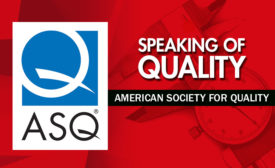Home » Keywords: » culture of quality
Items Tagged with 'culture of quality'
ARTICLES
Lean with Lazarus | Ian R. Lazarus
If the culture in your organization is essentially "do the best you can," then you really need to take a closer look at these methods.
Read More
Management
The Price of Excellence: Understanding the Value of Quality, Part 2
Companies that strive for quality and their business goals are likely to achieve both.
March 19, 2024
Quality Headline
Onslaught of Aviation Incidents Prompt Investigations, Call for Changes
March 12, 2024
NDT | Ethics
Nondestructive Testing: Is there an ethics problem?
A whistleblower shares his story.
March 12, 2024
Fellow Traveler | Daniel Zrymiak
Influence Without Authority with Stature
People respond positively to trust and confidence, and this builds a momentum of successful collaboration.
December 27, 2023
From the Editor | Darryl Seland
Maps Have Been Helping Us for a Thousand Years
They've been helping us get where we are going for a thousand years.
June 15, 2023
Quality 101
Building Blocks to Improve Organizational Culture
Lay out a road map to achieve organizational excellence and build a culture around it.
May 30, 2023
Face of Quality | Jim L. Smith
Organizational Culture
Workplace culture takes work but delivers value
April 8, 2021
Speaking of Quality | Kathy Lyall
Culture of Quality
Do employees "live" quality in all of their actions?
August 3, 2020
Sponsored Content
How to Leverage QMS Software to Promote a Culture of Quality
October 25, 2019
Get our new eMagazine delivered to your inbox every month.
Stay in the know with Quality’s comprehensive coverage of the manufacturing and metrology industries.
SIGN UP TODAY!Copyright ©2024. All Rights Reserved BNP Media.
Design, CMS, Hosting & Web Development :: ePublishing















